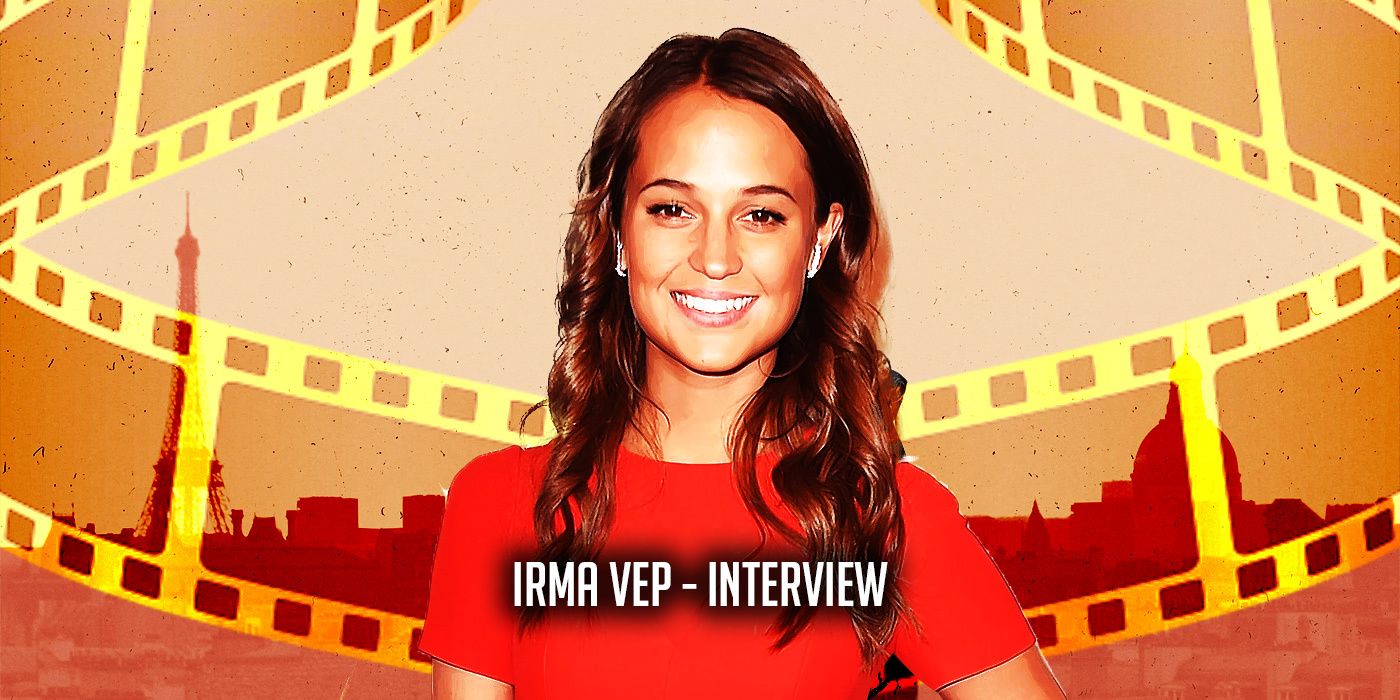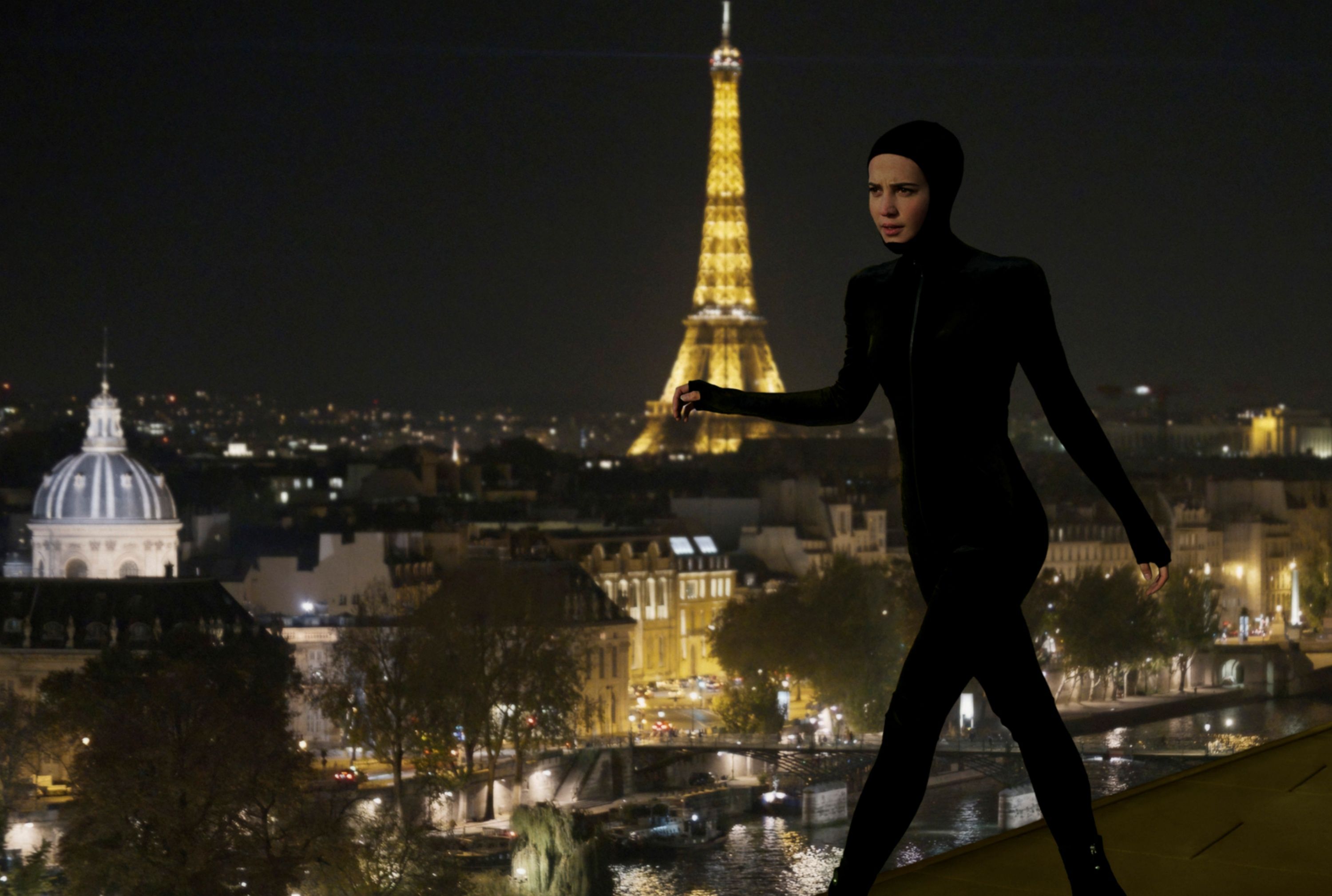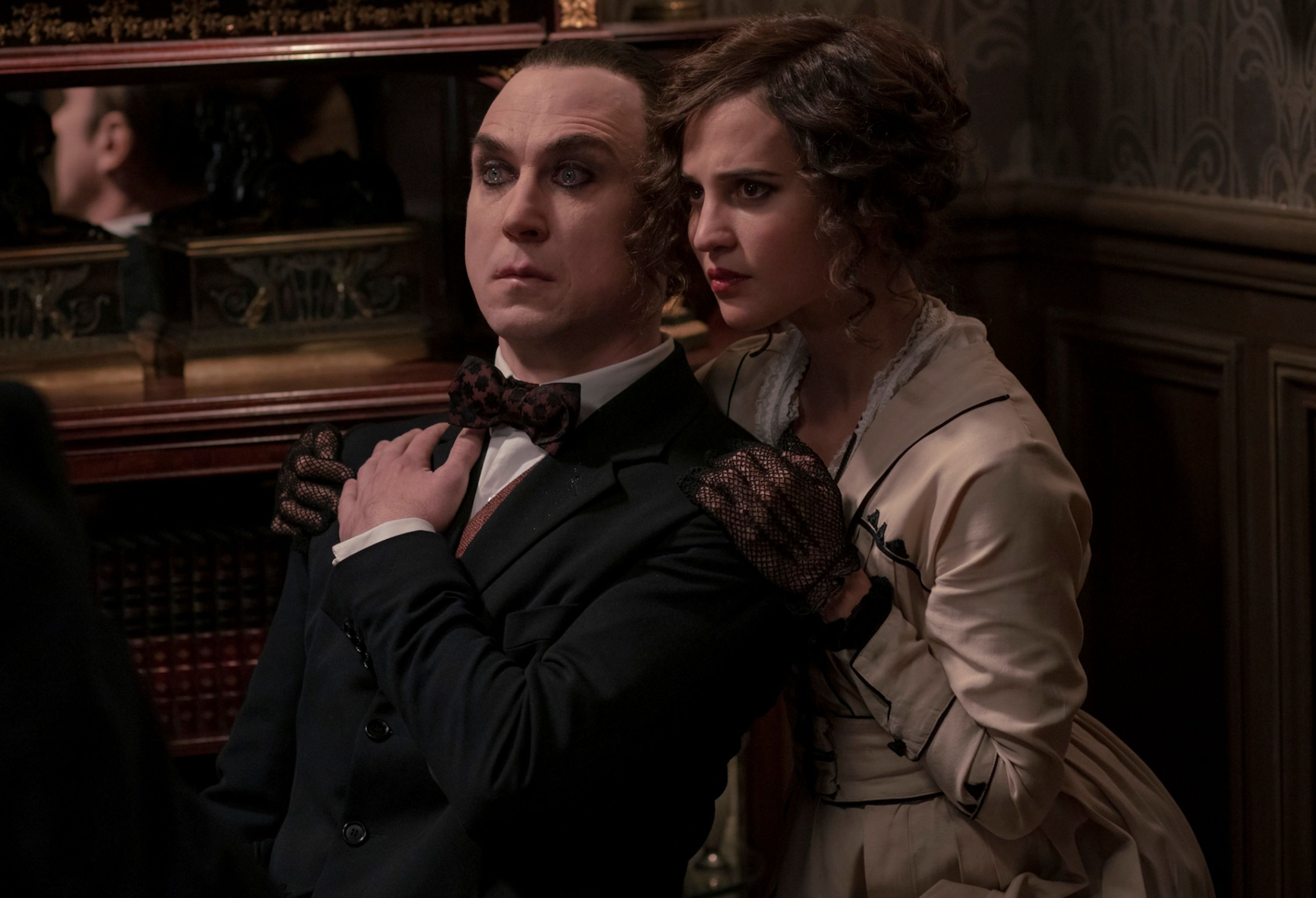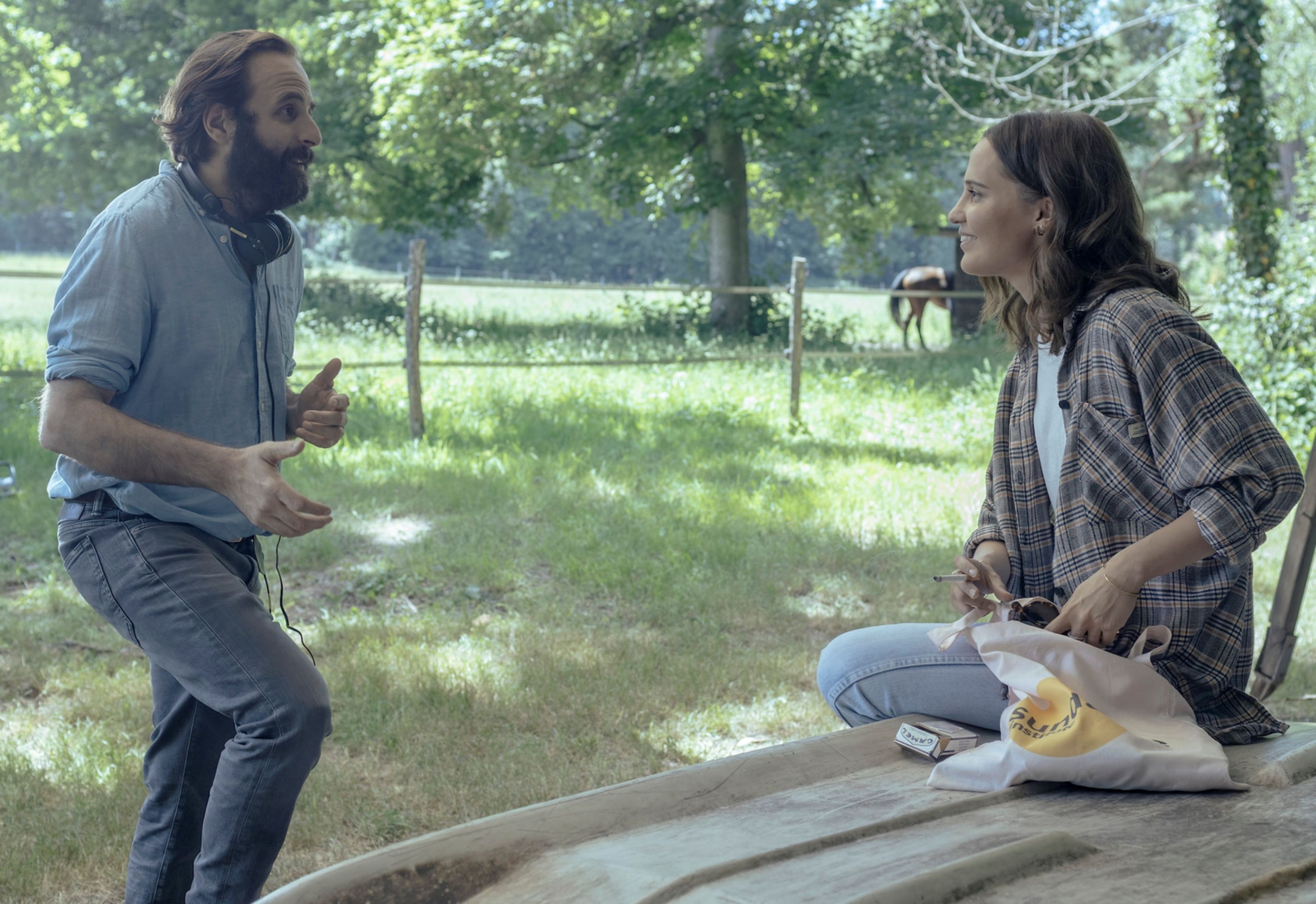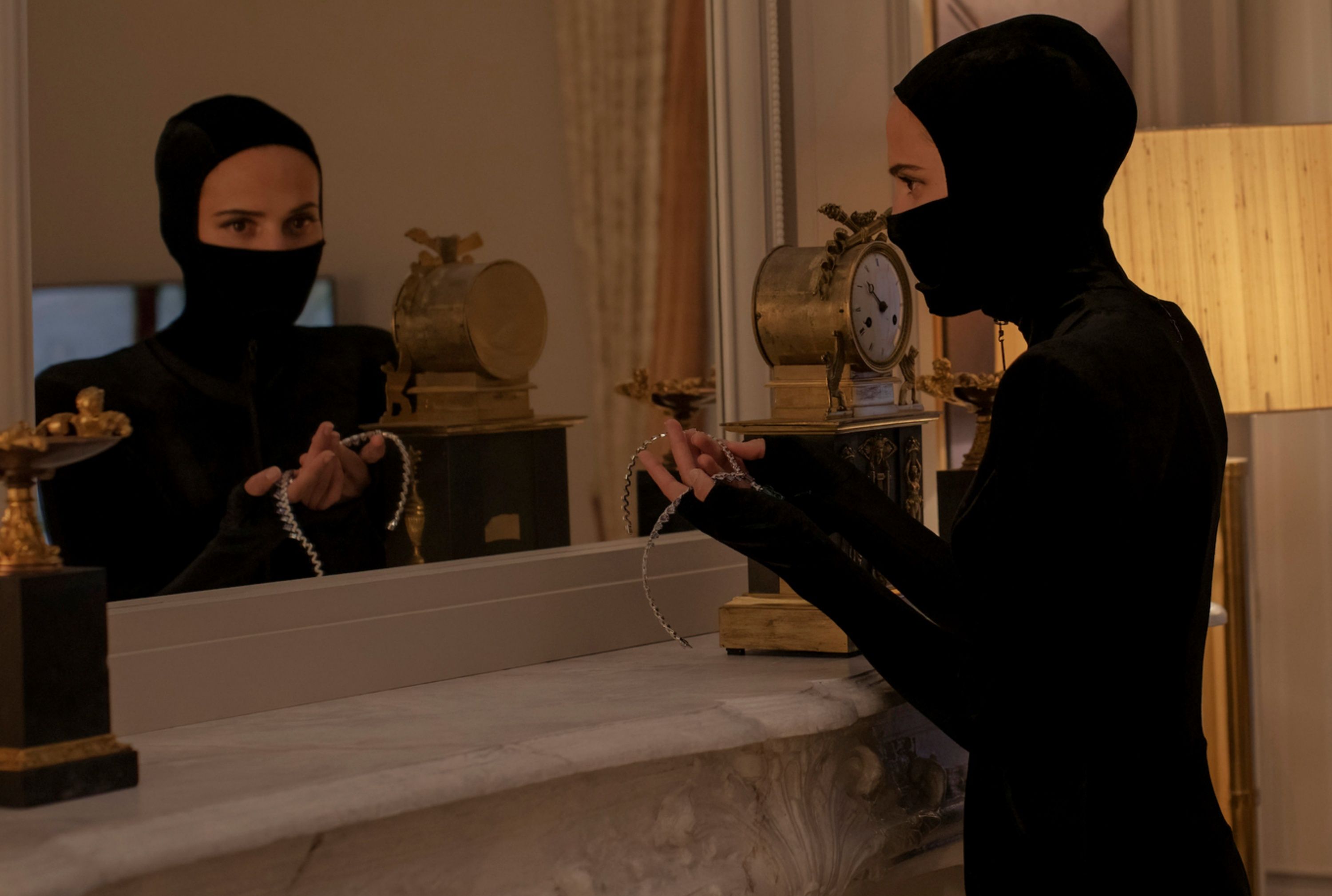From writer-director Olivier Assayas (Clouds of Sils Maria), the eight-episode limited series Irma Vep expands on and reimagines the filmmaker’s 1996 indie classic feature film of the same name, which was inspired by the 1915 silent era serial Les Vampires, and is both a love letter to movies and movie-making while also illustrating just how all-consuming the art form can be for the artists. At the center of the story is Mira (Academy Award-winner Alicia Vikander, who’s also an executive producer), an American actress disillusioned with Hollywood and reeling from a breakup who decides to shake up her life by transforming herself into the catsuit-wearing master criminal of the Parisian underworld, known as Irma Vep, in the hope that it will lead to some career inspiration.
During this 1-on-1 interview with Collider, Vikander talked about what she found most appealing about this unusual and unique project, her experience collaborating with Assayas, what she enjoyed about getting more involved as an EP, the power of the catsuit, her process for leaving a character behind, always knowing why you take on the projects you do since you have no say in their final outcome, why she doesn’t go back and watch any of her previous work, and that this is the first time she’s taken the summer off from work without knowing what’s next.
Collider: This has been such a fascinating show to watch.
ALICIA VIKANDER: Oh, cool. I’m happy to hear it.
This is not an easy project to explain, so when this came your way, how was it presented and described to you? Was it something that immediately intrigued you? Were there questions you needed answered first? What was your reaction, when this was all laid out for you?
VIKANDER: I’ve known (creator) Olivier [Assayas] for quite a few years. We’ve been friends and have seen each other, over the years. So, I was in Paris and we had lunch, and then he brought up this idea that was brought to him, about maybe making a TV series based on his movie. To be honest, I probably had the same reaction that most people had of, “Olivier Assayas doing this? What?” I asked him, “Are you saying this for real? Are you gonna do this?" He was like, “Yeah, I think I wanna do it.” He asked if I would be interested, before he started writing it. I’m huge fan of Olivier. I did not know what this was gonna be, but I love the original film and I think he’s an incredible writer and director. So, after that lunch, I said, “Yeah, I’m in.” And then, he went and started to write it. I had the experience of people watching the show, getting these episodes rolling into my mailbox, every three weeks. It was pretty cool journey I was on, as well, getting to know Mira and all the characters in the series, and realizing where this show would go. And it all comes down to the fact that I had a huge amount of trust in Olivier and I was very intrigued to see what he would do with this. And then, of course, I realized that this was gonna be a very interesting group, but also a very challenging part, or parts, that I was gonna get to dive into. I loved the revelation of what the series was gonna be, over those months, before we actually started to shoot. It was all written and done, when we started to shoot.
It seems that something like this really does depend on the vision of the filmmaker. That’s really the crucial component in all of this. What was that collaborative relationship like, throughout the production? As not just the lead in this, but as an executive producer, did you guys communicate throughout the production, or because all the scripts were ready ahead of time, did you have all those conversations before filming started?
VIKANDER: Most discussions probably happened before. There are a lot of TV series that shoot episode by episode, but because we had the same director and writer, and the fact that we had all of the scripts, and like a certain main character in the series wanted to convince, we shot this like a long film. We shot it out of order, as well. It felt like a very, very long independent film that we shot because we had scenes from episodes one and eight in the same day. Even though I had read all the scripts, after seeing each episode, I’ve gotta give it to Olivier. I don’t know how he did it. Part of you could say, “That shouldn’t work.” You shouldn’t be able to jump between these ideas of time, or characters playing each other. It’s a lot. But his talent is incredible. Somehow it works. I buy it. I really loved stepping into this universe, and playing with and bringing up all these discussions and realities about our industry that I think are quite funny and interesting.
Being involved as an executive producer can mean that you are involved in so many different areas of a production. As you’ve dug deeper into that side of a production, what are you finding most interesting? What are you finding yourself most drawn to doing, apart from just the acting?
VIKANDER: I think being part of putting a group and a team together, with Olivier. There were already a lot of people that he’d worked with before and who he’s friends with now because it’s been a long career. And then, it’s the conversations. Obviously, he’s the writer, but we’d have long discussions about thoughts and ideas, regarding story or different characters or how to shoot things. The fact that he, from the beginning, let me be a part of that and a part of those discussions, I absolutely loved.
Irma Vep wears a catsuit, and the deeper Mira gets into character, the more that she stays in that catsuit. What was that like to wear and spend so much time in? When you wear something like that, your movement changes, your posture changes, and you slink around as you’re wearing it. Was that something that you even had to spend much time thinking about, once you were in the suit?
VIKANDER: It’s interesting, Mira actually has a line there somewhere about how it is a bit of magic. One of the first things, when I start to embody a character in whatever film I’ve made, is when you have your first costume fitting. You can have ideas, but that’s a bit of a revelation because suddenly things don’t work, and they’re not right, but you don’t really know why. And then, suddenly, you put something on, and you’re like, “Oh, there she is.” Everyone feels it in the room, not only me, but the costume designer and the director. It’s like, “Ah, all right. So, that’s her.” That’s quite powerful. With a very distinct costume like this one, all the things that remind me that I’m me are erased. Even if I look in a mirror, I can almost not see myself anymore. It helps. It feels a bit like during the pandemic, when people wear masks. When you walk out, you felt a bit more lonely, in a nice way, because you’re separated from other people. And then, if you’re fully in this, that was definitely the feeling. I was almost like, “People might not be able to see me now. I might just be invisible.”
When you have a costume that is so identified with the character, were you sad to leave the suit behind, or are you happy to never have to wear it again?
VIKANDER: Yes and no. Something that tight is not comfortable, but then, it was fine when we did night shoots on the roof because it was actually quite warm. When we were shooting it, when I did my last day in the suit, that was a bit of a farewell. It was a little goodbye because it made Mira’s character become more defined to me. That side to her, or the influence that she gets from Irma, is so strong. It was specific. It’s always a bit sad leaving a character behind. In one way, that’s also told, when you see the end of the series. You start to look ahead towards something new, and then suddenly, without knowing it, your interests start to move to maybe the next thing. That doesn’t mean that it’s not a bit of a melancholic feeling, saying goodbye to the character, and also to all the people that you’ve shared a very intimate and strong period of time making this movie together.
We hear about filmmakers haunted by their stories, and actors can be consumed by a character. I’ve interviewed actors who’ve told me about characters that they found very difficult to leave behind, that lingered a bit longer than they maybe would’ve liked. Have you ever had that happen? Do you find that some characters have lingered with you a bit longer than you would have wanted them to?
VIKANDER: No. Right now, it’s the first time in my career when I actually finished a job and don’t know what I’m gonna do next. I needed to have a proper summer off. But before this, like Mira, I’ve always known what I’m doing next, and that becomes an obvious tool that suddenly makes your thoughts transition towards something else. When I’m excited about a new role, it’s a bit like this crush, or this feeling of excitement and the unknown that lies ahead. It’s like, how are you gonna tackle this? How are you gonna start preparing? What’s this character gonna be like? It feels terrible to say, but it’s almost like that starts to outshine the thing in the past. It feels so sad, starting to move on, but it is sad. For me, more than anything, I normally feel what you can see with Mira and René. I feel like some of the relationships with people, when you’ve all worked so hard, especially making independent films, which can sometimes be impossible, and yet you somehow make it all work, it’s very much a group effort. That I can feel, but it helps moving on to the next. That’s terrible. It’s like a rebound. I just move on and leave the other one behind.
In this story, Mira finds herself in a position where she wants to change up her career a bit. How many times have you had that desire yourself? Where are you at with your career now and what are the things that are most important to you, when it comes to projects and characters?
VIKANDER: I’ve obviously done bigger films, or more commercial ones and less commercial ones. Mira is struggling with having a lot of voices surrounding her and the idea of what the world wants her to do, and she’s realized that she needs to listen to herself. That’s what starts to get to her, the fact that she’s maybe made choices that aren’t truly hers. That, I understand, because that’s what I realized. At a certain point, and I’ve done it now for a big part of my career, you have to know why you make the films. You can never know whether a film is gonna be good or bad, and that’s the beauty and magic of it. But you need to do it, knowing that you’re in it because you believe in it and you want it. It feels like that’s the pivotal point and that’s what’s happening, with where Mira is at now and where she’s gonna continue to go in the future.
As an actor, you really don’t have any control over whether a film will turn out good or bad. You also don’t have any control over whether, even if a film is good, anyone will see it. There are all these weird things that come into play, so it feels like the experience that you have on set and the connection you have to the character is the most important.
VIKANDER: That needs to be first. If the project doesn’t end up where you think it should go, and you’ve tried to foresee any of those things, that’s just gonna make you miserable. Maybe this is also getting older. I don’t know. Maybe it’s a mix of things. But for me, it’s not the TV series. I love watching all the cuts and edits of it, when it’s still in the edit. It’s almost this magical point. When the series is out, I don’t know if I’m ever gonna watch it again. With most of my films, I’ve never really gone back and watched them. We’ll see if that happens one day, when I’m a lot older. Who knows? I don’t carry the film as how the world or how I even look at films that I watch myself. With the ones I’ve made, they’re these months and months of preparation and work, and it also my life. I spent five months working in Paris and living there with my family, and I had an everyday life. The whole shoot of this involved so much more than what the final product is. I love that process and I definitely take it into account. Especially on this one, I had such an amazing time, and that goes to Olivier, who’s the kindest person and one of the most brilliant, intellectual artists that I’ve met. He works with people that he has a connection with. It was pretty cool to see how a lot of the people that he had on set were people he’d known for a long time or that he has a connection with. It was such a friendly vibe. That’s a good thing to balance out, considering how stressful, a series can be, as we know, after watching the series.
You said that you don’t know what you’re doing next. Are you forcing yourself to take a break? Have you just not found anything that you’ve connected with? I know the Tomb Raider sequel has been talked about for years now, so is it just a matter of things developing further, or did you just want to take a break right now?
VIKANDER: I don’t think I’ve ever, until now, wanted to stop. Maybe I’ve had a bit of fear of not knowing what’s next. And I don’t right now, which is pretty amazing. Maybe this is having a kid. I don’t know. But it’s a nice feeling. It doesn’t take away, at all, my love and passion for what I do. And I’m still, very much, starting to be excited about what it is I’m going back to work with. It’s gonna be quite a nice thing going back to work and actually not having the stress of, like we talked about, leaving something behind at the same time. Instead, it’s the future. I’m pretty excited about what that’s gonna be. And there’s the fact that I know I’m only gonna make that choice because it’s something that I’m excited about. And I haven’t had a summer off since I was 21. I haven’t had a summer, ever. It’s pretty exciting. To be able to do that with my family, and my husband and baby, is pretty cool. I think it will only give me more to play with, when I probably soon go back to work again. And then, I’ll be back on it.
Irma Vep airs on Monday nights on HBO and is available to stream at HBO Max.

